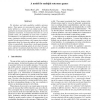Free Online Productivity Tools
i2Speak
i2Symbol
i2OCR
iTex2Img
iWeb2Print
iWeb2Shot
i2Type
iPdf2Split
iPdf2Merge
i2Bopomofo
i2Arabic
i2Style
i2Image
i2PDF
iLatex2Rtf
Sci2ools
101
click to vote
ICTAI
2008
IEEE
2008
IEEE
A Model for Multiple Outcomes Games
We introduce and study qualitative multiple outcomes games. These games are noncooperative games with qualitative utilities (i.e., values over an ordinal scale), strictly qualitative uncertainty and possible coordination. By strictly qualitative uncertainty, we mean that when there is a set of possible events, the probability of each event is unknown. Coordination is a way offered to the players to remove uncertainty. Qualitative multiple outcomes games is a model for a number of multi-agent problems where agents have minimal information about the interaction effects and where probabilites are unavailable. Among them is multi-agent planning where autonomous planning agents do not share the same goals, and have to generate plans that interact with those of others in a way they cannot unilaterally predict or control.
Artificial Intelligence | ICTAI 2008 | Multiple Outcomes Games | Qualitative Multiple Outcomes | Qualitative Uncertainty |
Related Content
| Added | 31 May 2010 |
| Updated | 31 May 2010 |
| Type | Conference |
| Year | 2008 |
| Where | ICTAI |
| Authors | Ramzi Ben Larbi, Sébastien Konieczny, Pierre Marquis |
Comments (0)

